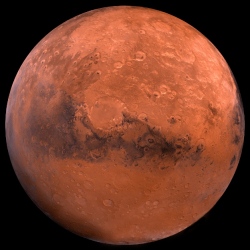
A fatty acid might be among organic molecules discovered on Mars by Nasa’s Curiosity rover. However, it’s not possible at this stage to determine whether the compound has a biological or non-biological origin, and contamination could still be responsible for the finding. The results come from Curiosity’s SAM instrument.
Nasa scientist Daniel Glavin described the results from the first "wet chemistry" experiment carried out by Curiosity. A long-chain carboxylic acid, or fatty acid, was a good fit for one of the data peaks detected in a mudstone called Cumberland, he told an audience at the meeting. A form of alcohol molecule may also be among the compounds analysed.
The preliminary result will excite scientists because fatty acids are key components of the cell membranes found in all life forms, including microbial organisms. Dr Glavin told an audience that the result was "provocative", and said the link to biology was the "million-dollar question". But he explained that a non-biological origin was equally plausible at this stage of the research.
One scientist commenting on the presentation suggested that contamination could not be ruled out as a cause of the signal.
